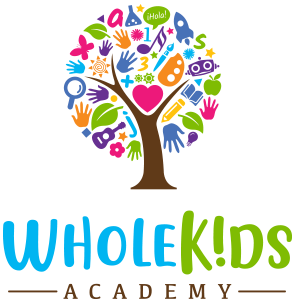
Full Language Immersion for Whole Kids
At Whole Kids Academy, Spanish is spoken about 90% of the time. Our teachers are native Spanish speakers and they communicate with our children, lead activities and teach a variety of subjects in the language.
Young children can easily learn new languages
Benefits of Language Immersion
- Improved memory, cognitive thinking and problem solving skills
- Enhanced multi-tasking skills
- Strong observational skills
- Strong listening skills
- Better performance in other academic areas, including math, reading comprehension and vocabulary **
Myths about language immersion
Learning a second language increases language delays
Research suggests that monolingual and bilingual children meet major language developmental milestones at similar times.
Learning a second language will confuse my child
“There is no research evidence to support this. On the contrary, use of two languages in the same conversation has been found to be a sign of mastery of both languages. “
Learning to read in English and Spanish will cause confusion
“A recent study of the reading ability of 134 four- and five-year-old children found that bilingual children understood better than monolingual children the general symbolic representation of print…. Numerous other studies have also shown a positive relationship between foreign language study and English language arts achievement. All of these results suggest that second language study helps enhance English and other academic skills.” ***
Is a Spanish immersion program right for your child?
If your family speak Spanish at home...
Your child’s understanding of their native language may be enhanced by a Spanish immersion program, as they will begin to see the roots of English words that are present in many foreign languages.
If your family speaks a language other than Spanish at home...
Your child will become fluent in the language they are being taught, even if it is not spoken at home. In addition, language immersion may make it easier for your child to learn other languages in the future.
If your child learns best by direct experience...
An immersion program will be a good fit and allow them to easily learn Spanish.


